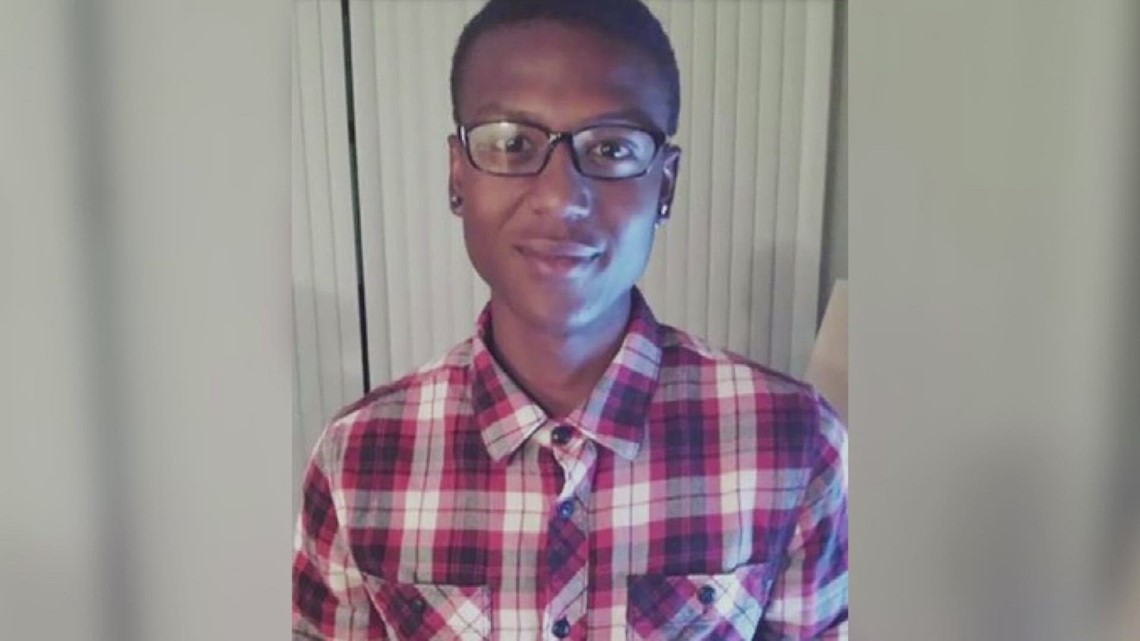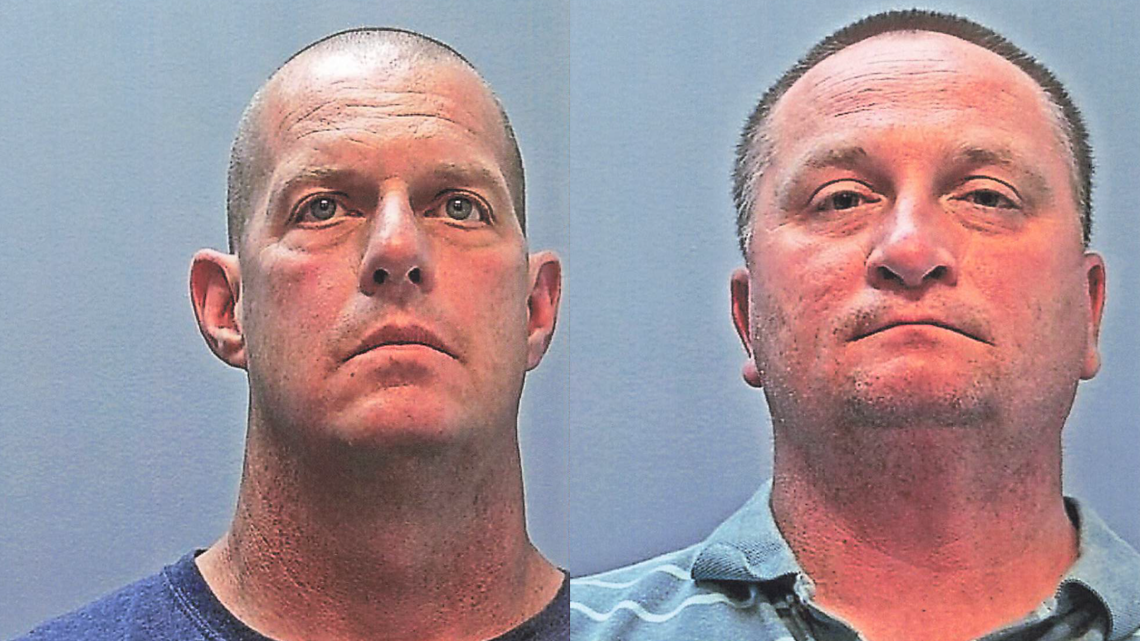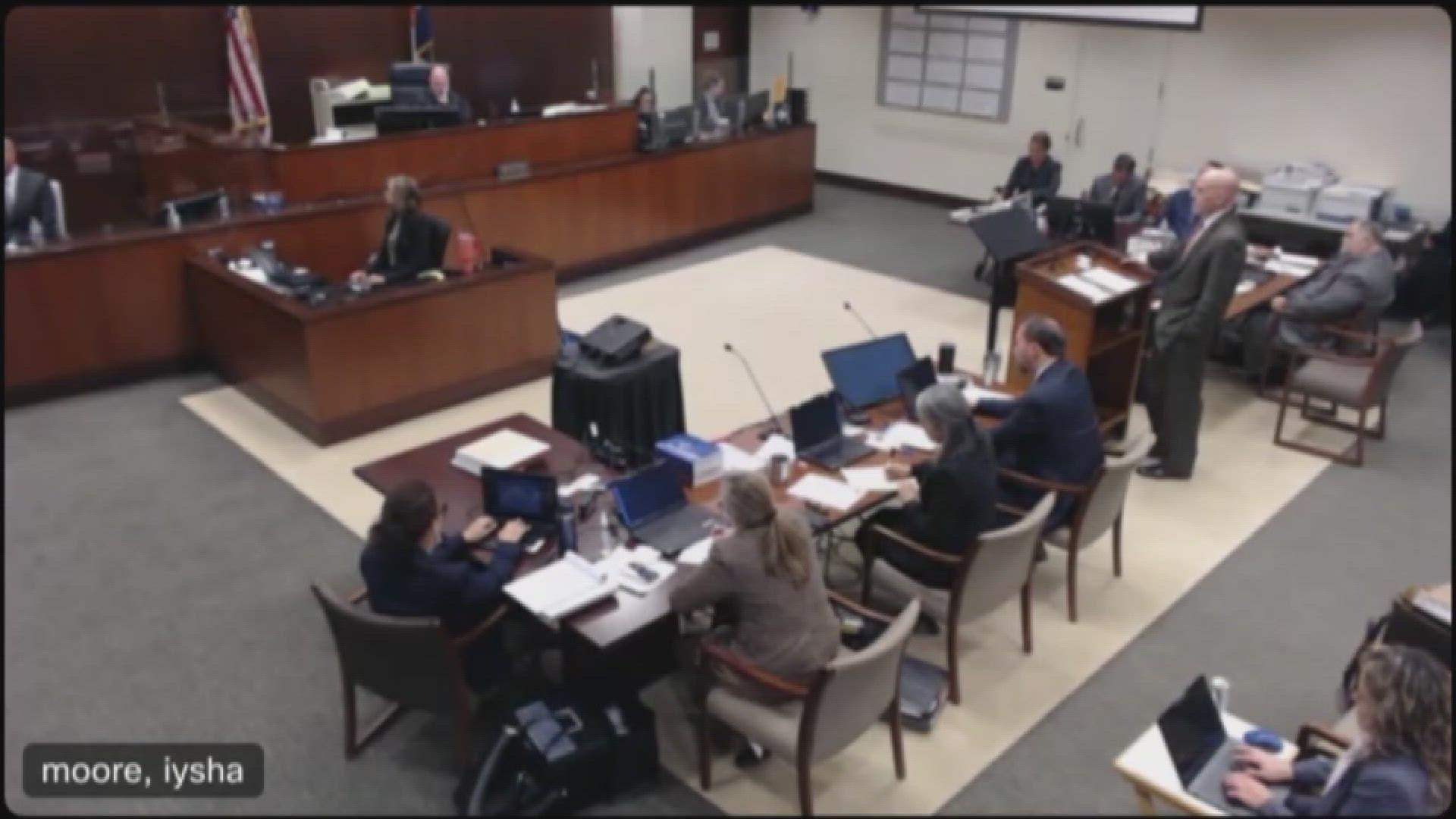AURORA, Colo. — The two Aurora Fire Rescue paramedics charged in the 2019 death of Elijah McClain took the stand Monday to testify and defended their use of the sedative ketamine - which has been blamed as the cause of McClain's death.
Peter Cichuniec and Jeremy Cooper are both charged with reckless manslaughter and assault related to McClain's death. They injected him with the ketamine on Aug. 24, 2019, after he had been in a struggle with officers during which McClain was forcibly taken to the ground and restrained.
Cichuniec told jurors that McClain was struggling with officers more than he'd ever seen during the thousands of other calls he's been on in years as a paramedic.
"They kept telling him to stop resisting. Stop it. Don't do that," Cichuniec said about what he first observed. "It just seemed like the officers were struggling more than I've seen before on other calls. They had their hands full with three of them that are trained to restrain or subdue parties. It wasn't the same as the other calls I've been on."
Cooper said when he first arrived he felt the scene felt a little bit "odd" and that maybe it was "something more serious than we were lead to believe."
The three Aurora officers initially contacted McClain after someone called to report a person wearing a ski mask and acting suspicious. Within seconds of the contact, the first officer grabbed McClain. That same officer placed McClain in a carotid hold, which briefly cut off oxygen to his brain.
Cichuniec was the highest-ranking crew member that night, so it was his role to coordinate care efforts, but he said that when they arrived they "never heard anything" from Aurora officers about why they had been called to the scene.
Cooper testified he did not know that McClain had been put in a carotid or that he had lost consciousness.


Cichuniec said he began scoping out the best way for the ambulance to get in while the others, including Cooper, went over to McClain. A few minutes later, Cichuniec said, he joined his team.
He said that he believed Cooper attempted to take McClain's pulse but was unable to do so because an officer picked McClain up and body-slammed him into the ground.
"What effect did that body slam, as you put it, have on you at that moment?" his attorney Michael Lowe asked.
"Well, my sense of urgency got a little broader -- we needed to get our tools there, we needed to tend to Mr. McClain and we needed to help him as soon as we can," he replied.
The ambulance had not yet arrived, and at that point, Cichuniec said he got on the radio and asked how far away they were. On cross-examination, prosecutors pointed out that they had many tools on their fire engine they could have used.
"You testified that one of the officers body-slammed Mr. McClain to the ground, right?" prosecutor Jason Slothauber asked.
"Yes sir," Cichuniec replied.
"And when Mr. Lowe asked you that, you said my sense of urgency got a little broader. We needed to get our tools there. Is that correct?" Slothauber asked.
"Correct."
"So, at that point in time, is that when you ordered Mr. DeJesus or Mr. Bradley [the EMTs] to go get your tools from the fire engine?"
"No, sir."
"That's because you never ordered Mr. DeJesus or Mr. Bradley to go get your tools from the fire engine."
"No, sir," Cichuniec replied.
Cooper also testified about that body slam by officers and said it caused him to pull back and try to de-escalate things.
"When I saw that, it was pretty shocking, so I told the officers, OK let’s just leave him here. Leave him there. That was my attempt to kind of de-escalate things," Cooper said.
"Obviously, now they’re using kind of violent control methods. I didn’t want that to happen anymore, because that’s now harming Elijah and that makes my job with him as my patient more difficult, so I didn’t want any more injuries or any more of that type of behavior to happen."
Cooper testified that he believed McClain was exhibiting signs and symptoms of excited delirium, which, to believers, is described as a life-threatening condition marked by superhuman strength, imperviousness to pain, and severe agitation.
He told jurors that when Aurora officers reported that McClain was "definitely on something," was "crazy strong" and had almost done a pushup with several officers on his back, the further solidified his belief that McClain needed ketamine - the only drug they could use under protocols for excited delirium.
"The ketamine is a dissociative, so the behavior we’re seeing that’s consistent with excited delirium, we need to stop or break that behavior to then safely transport him to the hospital because it is a very serious medical condition," Cooper said.


Cichuniec pointed out that in 2019 there was no policy in place related to co-responses with Aurora Police and Aurora Fire Rescue. He maintained that while in handcuffs, McClain was not his patient and that he was in the control and custody of the police department.
"I thought I heard you say they’re not even your patient until they come out of handcuffs, is that right?" Slothauber questioned.
"Correct,” Cichuniec replied.
"Mr. Cichuniec that’s not true, is it?" Slothauber asked.
“It is in 2019, yes.”
"If he's not even your patient, then how can you inject Mr. McClain with ketamine while he’s wearing handcuffs?" countered Slothauber.
“Because that is the medication he needs to become our patient,” Cichuniec replied.
"While he’s still in handcuffs?"
"Yes," he replied.
"So he is your patient while he’s in handcuffs?"
"Yes."
"OK. So what you said on direct that he’s not your patient until the handcuffs come off, that is not correct?" Slothauber asked.
“Kind of,” Cichuniec replied.
McClain was injected with 500 milligrams of ketamine - which is given based on a patient's weight. According to the dosing guidelines, the dose McClain got was for someone weighing about 80 pounds more than him. Medical experts have said it caused McClain's death.
Cichuniec testified that he estimated McClain weighed 80 kilograms, which is about 176 pounds. Even with that estimate, McClain would have gotten less than 500 milligrams. Still, Cichuniec testified that he believed the dosage was appropriate, based on his training.
"The reason you moved it up to 500 is because you thought he was extra agitated," Slothauber said.
"I moved it up to 500 because of the training we had on ketamine," Cichuniec replied. "We were taught to give either 300 for small, 400 for medium, and 500 for large. So I went off the training we were given."
"Now Mr. Cichunec one of the reasons you went up from 425 to 500 is because you thought he had a particularly agitated state and was showing signs and symptoms of excited delirium."
"That is correct and I'm not going to under-medicate someone by giving them 400. I'm going to go up to the next one per our training,” Cichuniec replied.
Slothauber pointed out there was nothing in their training that allowed them to go up in dosing. Cichuniec conceded the dose was incorrect under protocols and that nothing was written in training to allow them to increase doses, but that there were "side conversations," and he believed he followed training.
Cooper testified that he estimated McClain's weight as about 100 kilograms, or 220 pounds. He said he used his size as a guide in doing so and that he believed McClain weighed roughly 50 pounds less than him, which is why he said he chose the 500-milligram dose.
On cross-examination, Slothauber repeatedly grilled Cooper about discrepancies between his testimony and what he said during an interview with an Aurora Police investigator in September 2019.
Video of that interview was shown to the jury earlier in the trial.
RELATED: Interviews with paramedics contradict body camera footage from incident with Elijah McClain
The investigator asked Cooper what effect the ketamine had on McClain.
“While you were administering it, do you remember what the patient was doing?” the investigator asked in the video.
“Still actively fighting,” Cooper said. “Any time that the patient would try to be placed kind of on his side, he would try to walk up the little grassy embankment, try to fight with the officers.”
"Is that your testimony that when you told them [the officers] to place him on his side that he would then continue to try and crawl out of their possession and walk up the embankment?" Slothauber asked Cooper on Monday.
"There was a few times, on his side, that yes he struggled a little bit more and was moving his feet, yes sir," Cooper replied.
"Mr. Cooper, there is a very very big difference between struggled a little bit more and tried to crawl out of their possession and walk up an embankment, right? Those are very different things."
"I believe I was referring to him moving his feet," Cooper replied.
Testimony is set to resume at 8:30 a.m. Tuesday.
The paramedics are the last two of the five men indicted in McClain's death to go to trial. In the first trial, a jury returned a split verdict for Aurora officers Randy Roedema and Jason Rosenblatt. Roedema was found guilty of criminally negligent homicide and third-degree assault and will be sentenced in January. That same jury acquitted Rosenblatt of all charges. Officer Nathan Woodyard was acquitted in a separate trial.
SUGGESTED VIDEOS: Elijah McClain death

